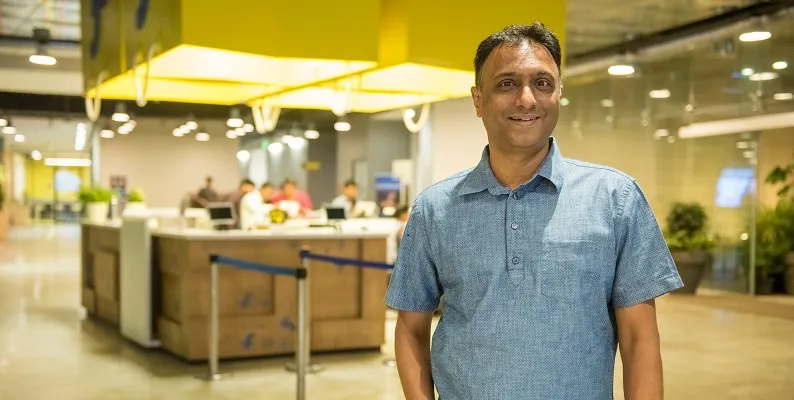[YS Exclusive] Straight talk with Flipkart’s Kalyan Krishnamurthy, the Indian CEO the world is watching
In an exclusive interview with YourStory, Flipkart CEO Kalyan Krishnamurthy gives a peek into the Walmart-owned company’s roadmap for the future. Find out how India’s largest ecommerce company is solving problems for the country that have not been solved before and seeding many firsts like innovating for the diverse and ever-evolving Indian customer.

As I step into one of the three swanky buildings in Flipkart’s new campus at Bellandur, a top IT hub in Bengaluru that accounts for over 12 percent of the country’s IT Services GDP, I can sense the excitement as swarms of young, tech-savvy people mingle around.
There’s a hustle-bustle in this campus, which houses around 7,000 of the total 30,000 Flipkart employees. The excitement is itself reflective of the potential of and exhilaration around the Indian ecommerce sector, one that Flipkart has disrupted and defined over the past decade.
I’m here to interview Kalyan Krishnamurthy, the man at the helm of Flipkart. It’s an interview I’ve been looking forward to. There are so many stories to tell, so many developments to talk about, and I find myself eager to hear the man who has and will be steering Flipkart towards the next leg of growth.
The path to future growth
As I sit down across from him at his office on the ground floor, over a cup of hot ginger tea, Kalyan Krishnamurthy wastes no time in talking about the year of “tremendous growth” that Flipkart has witnessed this year. Next, he launches straight into outlining the multi-billion dollar initiatives the company launched this year -- ventures that place it on the path for further growth in the future.
Flipkart has seen a significant jump this year in the spend and transaction per user, Kalyan says. “We have seen a 20 percent increase in the average spend per user this year,” he adds. When you look at it in terms of the 80-100 million overall ecommerce users in India, this increase in wallet share and repeat transactions have become a key benchmark of growth that Flipkart is charting.

Kalyan tells me that this year, Flipkart has exceeded its short-term goals, relating to customer and transaction growth across different categories and launched several multi-billion dollar initiatives. These initiatives include the launch of 2GUD, an independent marketplace for refurbished goods, FurniSure, Flipkart’s durability-certified furniture store, as well as its loyalty programmes, grocery, and app-in-app, in addition to its fintech scale-up.
In August 2018, Flipkart launched 2GUD, a marketplace that features refurbished smartphones, tablets, laptops, and other electronic accessories, marking the company’s foray into the refurbished goods market, which is expected to touch $20 billion in the next five-six years.
An industry first and an initiative that came out of understanding the Indian consumer behaviour, 2GUD, according to Kalyan, has tremendous potential. “Imagine if your house help or driver wants to have iPhone etc but at an affordable price point and now he is able to do it with 2GUD.” Clearly, an opportunity that will only grow with the next 500 million users coming online.
With 2GUD, Flipkart also aims to solve the problem of trust deficit which is prevalent in the refurbished goods market and the company is doing so by ensuring that all products that are featured on this marketplace are thoroughly tested and certified with a three to 12 months warranty.
The company’s next phase of growth, Kalyan says, will come from scaling these initiatives across sectors and categories such as grocery, furniture, private labels, and fintech (which are, by themselves, all multi-billion dollar opportunities).
He adds,
“Our responsibility as a company over the next few years will be to scale and consolidate across all these initiatives.”
Partnering with innovative companies
Earlier this year, Flipkart has made some notable acquisition of startups in the technology space. The company acquired Liv.ai, an AI platform that converts speech to text in 10 Indian languages, to help the company tackle the language barrier, which is one of the biggest challenges that ecommerce companies in India face.
Flipkart also acquired Israel-based Upstream Commerce, which offers advanced, data science-based intelligent solutions to help local sellers boost their sales and better serve Flipkart customers.
When asked if Flipkart is keen on acquisitions as a growth strategy, Kalyan says, “Absolutely. Why not?” He says the company is eyeing more IT-driven acquisitions, as part of Flipkart’s vision to solve ecommerce challenges through technology innovations.
Partnering with innovative companies is a well laid-out strategy for Flipkart. For young fashion brands, Kalyan says Myntra’s Brand Accelerator Programme, which was launched in June 2017, has played a crucial role in supporting many emerging domestic fashion brands, with the e-tailer’s technical know-how as well as branding and analytics support.
Kalyan Krishnamurthy says,
“This programme has actually made investments and provided brand-building opportunities to many emerging brands and we’ll be doing more of this.”
Innovating for India
And yet, at the crux of the company’s many initiatives and partnerships lie its core vision of innovating for the Indian customer and solving the yet unsolved problems for the country. For this reason, the focus for Flipkart continues to remain the Indian market and the Indian consumer for the next few years.
In fact, throughout my conversation with Kalyan Krishnamurthy, the overarching theme was Flipkart’s commitment to the Indian customer and the leadership team’s passion and pride in being a part of this journey.
To be clear, proof of the company’s singular focus on customer centricity, something Flipkart has distinguished itself in the past for, is evident again in the various facets of the business -- whether it is in the backend they have built, with a different supply chain for different portfolios, or the post-transaction experiences.
In fact, the questions that weigh on the team are -- how do we increase the frequency of the customer’s visit/engagement, how do we increase the wallet share, how do we increase the transaction share, and how do we get next 100 million in the funnel?

“And we are doing all this through different ways like bringing a lot of affordability constructs to the table -- be it financing, having more selection to the private labels, more choices and unique and better collections,” Kalyan says.
Driving value for the Indian consumer
Flipkart is also creating value for the increasing value-driven Indian consumers in several ways. Kalyan Krishnamurthy says,
“Value and brand can easily go hand in hand together. Value does not mean unbranded. We are the only platform in India that works with all leading brands in the country to build a special portfolio/offerings for the country.”
Flipkart works closely with all the leading brands to do this -- be it Samsung, Xiaomi, Titan, and Puma Shoes, among others. “Also look at Levi's, which is an iconic global brand, they have a sub-brand Denizen, specially created for the Indian consumer. So basically, the brands that work with us are adopting the strategy of value enablement,” Kalyan says.
What it means to be the CEO of Flipkart?
In the end, I had to ask him the burning question in the wake of the intense attention and scrutiny that Flipkart has faced this year: what does it mean to be in the role that he is in? And he responded, in his quiet, unassuming way,
“I have the best job in the country because you get to shape and serve 200 million households. That’s a privilege and an opportunity. An opportunity to build many India-first solutions for consumers, solving problems that have not been solved before and bringing a lot many choices for users.”
As I returned from my meeting with Kalyan, I realised that such a thing as a Founder's DNA can exist outside a founder too. The passion, the drive, and the ability to take a team along are qualities not exclusive to founders alone.
Kalyan Krishnamurthy is no longer just a Tiger Global’s former executive put in place to run someone else’s company. Like Uber’s Dara Khosrowshahi, who I met in Delhi recently, Kalyan exudes the same reassurance that is easily transferred to the employees -- something Flipkart needs at this time, as do all of us who’re keen watchers and advocates of India’s growing tech ecosystem.


![[YS Exclusive] Straight talk with Flipkart’s Kalyan Krishnamurthy, the Indian CEO the world is watching](https://images.yourstory.com/cs/wordpress/2018/12/Kalyan-Krishnamurthy_1.jpg?mode=crop&crop=faces&ar=16%3A9&format=auto&w=1920&q=75)




